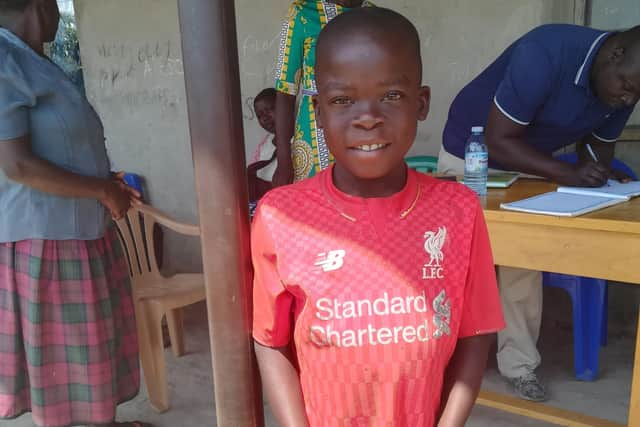Self Help Africa Special: ‘Getting HIV was better than starving’


Wearing a Liverpool football jersey and an uncomfortable smile for the camera, Kenneth is much like any other 11-year-old, except this meticulously polite little boy from an impoverished rural village in northern Uganda, is HIV positive and an orphan.
Wandering the streets, begging for scraps of food, Kenneth and his twin brother were saved by a local woman, Helen, a lady they call ‘their granny’, who looks after them, ensuring they eat and receive treatment for the virus transmitted in utero from their mother.
Advertisement
Hide AdAdvertisement
Hide AdOrphaned children are, sadly, not an anomaly in this part of the Teso sub region of Uganda. In Kenneth’s village there are an estimated 180 children without parents. The reason is shocking.


In 2003 warlord, Joseph Kony, launched his fanatical and murderous cult, the Lord’s Resistance Army (LRA), whose fighting force was made in large part by abducted children.
Up to 95 per cent of the population in the area were forced from their homes by the war. Nearly two million Ugandans, out of a population of 24.7 million, lived in refugee camps for fear of being attacked and killed in their villages.
Children have told how they had been forced by the rebels at gunpoint to abduct and murder other children.
Advertisement
Hide AdAdvertisement
Hide AdThe self-proclaimed prophet Kony, wanted Uganda to live by the laws of the Ten Commandments, claiming he was guided by spirits who told him what to do and whom to kill. The brutal murderer remains at large and is thought to be hiding in the bush in South Sudan.
Conditions in the so-called ‘protection’ camps were atrocious, with women raped or forced to sell sex in return for food. Many of the women, and their husbands, contracted HIV/AIDS, passing the virus on to their babies.
At the Acamutu community one woman says: ‘‘My husband told me to have sex with the soldiers. He said he would rather have HIV than starve.’’
The Acamutu PHAs (People who have accepted HIV/AIDS) group of 119 men and women was formed in 2007, after they returned from the camps.
Advertisement
Hide AdAdvertisement
Hide AdIt’s chairperson is Helen Aguti, a 45-year-old mother of 11 children, bright and handsome in a vivid print dress, who explains the sexual risks they took were a matter of life-and-death economics, for there is no social security net in Uganda.
‘‘People got the infection within the camp. There were issues of rape by LRA soldiers and also by other indigenous people. Not that it was necessarily rape. Life was hard, us women had to sell our bodies in order to get something to eat, that is why we took part in sexual activities and then we succumbed to HIV/AIDS and at the same time we transferred it to some of our husbands.’’
She added: ‘‘For years we were retained in the camp. There was war surrounding the camp so it was very difficult to go home. We had to eat whatever we got from within the camp. The only possible solution was for us to engage in sexual intercourse in order to get something for survival.’’
As time went on people within the camps eventually started developing health problems.
Advertisement
Hide AdAdvertisement
Hide Ad‘‘This coincided with an organisation that came into the camp to test people and that’s when we discovered that the HIV/AIDS virus had encroached on us,’’ said Helen..
‘‘It was a surprise to most of us. Some people died because of shock, but a few of us who remained decided to form a group.’’
As well as coping with the devastating diagnosis, Helen said stigma was pervasive.
‘‘Discrimination was everywhere, people didn’t want us. It was almost a mistake for us to identify ourselves to other people because the community really denied us and we felt lonely, but that also encouraged us to embrace ourselves into the group.’’
Advertisement
Hide AdAdvertisement
Hide AdWith a strong sense of solidarity the members rallied together, donating money so that when a member became sick they could get medicine in Kampala (Uganda’s capital).
Sadly, a few members died, but they kept contributing money, bought sheep and reared them in order to improve their economic situations.
‘‘Now, we were almost forgetting about the infection because we were more healthy and our sheep were multiplying. After the rebels left we found access to our homes and then we started our agricultural activities,’’ said Helen.
‘‘There were no oxen, but we could help one another to open a garden and plant using hoes. That’s how we were helping ourselves. Each member was able to get a sheep to keep at his or her home.’’
Advertisement
Hide AdAdvertisement
Hide AdIn 2014 the group received vital financial assistance from Self Help Africa, which enabled them to buy oxen, ploughs and accessories.
The charity’s help was also geared towards ensuring they had a healthy diet, for anti-retroviral medication for HIV is not effective if the diet is poor.
Helen said: ‘‘They trained us on group dynamics and financial management. They gave us money which we used for buying cassava cuttings and sweet potato vines for boosting the immunity of people who were HIV positive. Our bodies became healthy.’’
Self Help Africa also gave the community seeds, which they planted first for food, then later for selling.
Advertisement
Hide AdAdvertisement
Hide Ad‘‘They taught us how to manage the environment. They trained us on how to make Lorena stoves for cooking. These save energy by using less fuel, just a few sticks. There’s also less smoke, so it was conducive for women to use, they didn’t get red eyes.’’
l Our Self Help Africa series continues on Saturday as we hear how climate change is affecting farmers. If you would like to donate to the charity visit: www.selfhelpafrica.org.